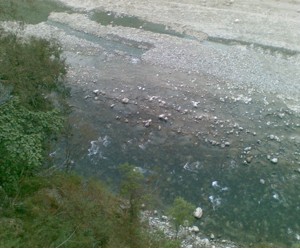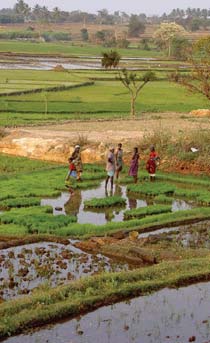/topics/demand-and-consumption
Demand and Consumption
Bringing life back to Chilika lagoon in India
Posted on 28 Nov, 2011 10:34 AMContent and Media Courtesy: International Union for Conservation of Nature
This 116,500 hectare brackish lagoon separated from the Bay of Bengal by a long sandy ridge was added to the Ramsar List of Wetlands of International Importance in 1981.This was because the lagoon was facing serious degradation due to siltation and choking of the seawater inlet channel, resulting in the proliferation of invasive freshwater species, the decrease in fish productivity, and an overall loss of biodiversity [1].
Water poverty in urban India - A study of major cities - A seminar paper - Tata Institute of Social Sciences
Posted on 05 Nov, 2011 12:02 PMThis seminar paper submitted for the UGC Summer Programme at the Jamia Millia Islamia University describes the findings of a study that explored the quantity of water used in domestic households vis-à-vis the recommended quantity of water consumption in seven major Indian cities, n
Water conservation through better irrigation
Posted on 26 Sep, 2011 11:30 AMArticle and image courtesy: IndiaWaterReview

The agriculture sector in India, like elsewhere in the world, remains the largest consumer of water. As much as 80-85 per cent of India's available water resources are deployed annually in the agriculture sector, with industry being the second-most largest water consumer. But, contrary to the amount of efforts being put among industrial consumers to bring down their water consumption, agriculturists remain stuck on age-old methods and systems that lead to wastage of water.
So, while industry has been spending money on conducting in house research and development (R&D) to bring down their overall water consumption for making goods and products as well as deploying technologies that treat and reuse water and wastewater better, the agriculture sector has maintained status quo. Across India, farmers are still using flood irrigation methods for their crops. Most of them have not even head of drip irrigation or are so poor that they cannot afford to invest in drip irrigations systems.
Water for Indian cities - Government practices and policy concerns - Issue Brief - Observer Research Foundation
Posted on 24 Sep, 2011 04:50 PMThe urban expansion in India has not been met by a similar expansion in infrastructure and basic services. This has severely affected the quality of urban life and economic growth.
"Meeting urban water challenges is matter of political will and priorities, not about technical solutions"
Posted on 17 Sep, 2011 08:55 AMGuest post by: Parineeta Dandekar
This year's World Water Week in Stockholm explored water and sanitation challenges faced by urban areas as well as the water, sanitation and equity challenges posed by urban areas. We take a look at some of the presentations and discussions that took place, especially with reference to India and South Asia.
Forecasting agricultural output using space, agrometeorology and land based observations
Posted on 03 Sep, 2011 06:29 PMThis document presents the proceedings of the annual review meeting by India Meteorological Department (IMD) on “Forecasting Agricultural Output Using Space, Agrometeorology and Land Based Observations” (FASAL) organized at YASHADA, Pune during 1-2 August 2011.
Adaptive water resource management in the Lower Bhavani project command area in Tamil Nadu – A research report by IWMI
Posted on 25 Aug, 2011 11:07 PM
To what extent farmers and water resource managers already practice adaptive management and whether it is practiced in an optimal manner or could there be areas for improvement based on recent advancements in the theory of adaptive management are some of the questions that are particularly appropriate in the light of rapid changes in river basin water use and also in relation to basin closure.
This paper draws on the development and use of water resources in the Lower Bhavani Project (LBP), with the LBP reservoir and the 84,000 hectare (ha) LBP command area. The project diverts water from the Bhavani River, a tributary of the Cauvery River in Tamil Nadu.
Biomass for sustainable development - Lessons for decentralized energy delivery in India – A report by World Bank
Posted on 22 Aug, 2011 07:55 PM It presents a summary of recommendations for enhancing the effectiveness of energy service delivery through a decentralized program, which currently finds a critical place in the Government‘s energy policies and electrification targets.
It presents a summary of recommendations for enhancing the effectiveness of energy service delivery through a decentralized program, which currently finds a critical place in the Government‘s energy policies and electrification targets.
The pilot phase of the Village Energy Security Programme has shown several lessons and the need for improvements.
Delhi Water Privatization - WASH News and policy update
Posted on 03 Aug, 2011 06:20 PMContent courtesy: India WASH Forum
Small and mini hydel projects – Standing Committee on Energy – Sixteenth Report (2010-2011)
Posted on 03 Aug, 2011 03:57 PMThe Committee took evidence of the representatives of the Ministry of New and Renewable Energy (MNRE) in January, 2011.





